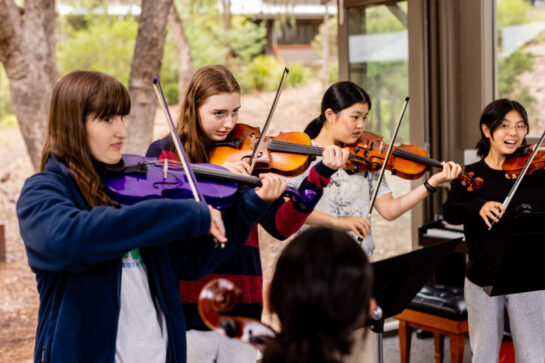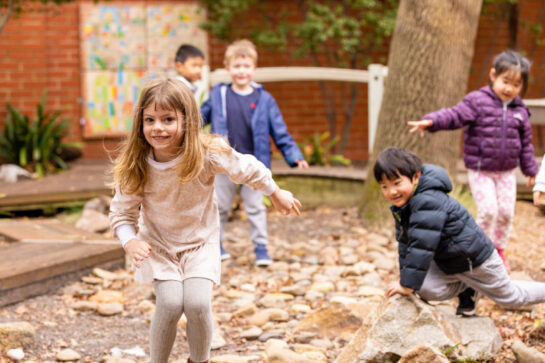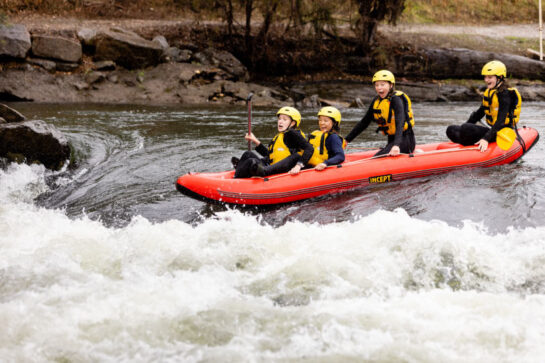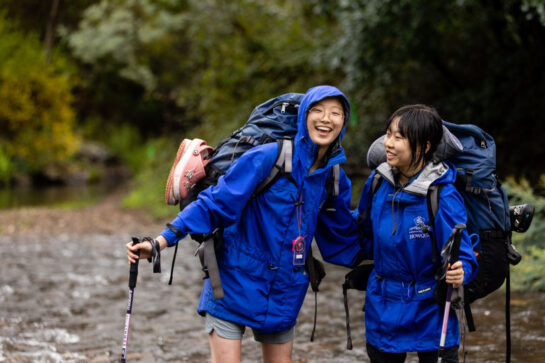The positive benefits of outdoor education
John MuirOf all the paths you take in life, make
sure a few of them are dirt
Outdoor Education is a broad term which includes more than the hiking or adventure activities which might first come to mind. We suggest that our children in the early learning centre participate in outdoor education because they undertake play-based activities outside, using movable or loose parts.
Our bush kindergarten provides another setting for outdoor education where the children play in a natural setting, using the materials around them in their play and becoming used to different types of weather conditions. For our older primary and secondary students, their exposure to outdoor education comes in the form of camps where there are different types of physical or adventure activities for them to participate in a variety of natural settings. Our Year 9 students participate in an outdoor program which includes more adventurous activities such as extended hikes, abseiling, canoeing and snow skiing.
There is quite an extensive range of research which gives attention to the value of outdoor education for the physical and social development of children and young people. Immersion in natural environments can improve one’s overall wellbeing and increase one’s feelings of self-efficacy and self-esteem. Most commonly reported outcomes in the research are firstly the development of self-confidence and resilience, along with improved communication, teamwork skills and pro-social skills. There are links with academic progress which refer to the enhancement of critical thinking and problem solving, along with improvements in mathematics and reading when students are doing hands-on learning.
Our ability to function well both socially and emotionally is a priority for the wellbeing and educational attainment of children and young people. Through outdoor education from the early years, our children and young people can develop core skills and attributes for social and emotional wellbeing.
Core Skills and Attributes
SELF-AWARENESS | The ability to recognise and describe your own emotions, thoughts, values and experiences and understand how they influence your behaviour. Developing self-awareness helps you to identify your strengths and weaknesses, giving you an accurate sense of your capacity to succeed in different situations and a well-grounded sense of confidence and optimism.
SELF-MANAGEMENT | The ability to deal with stress and regulate one’s emotions, thoughts, and behaviours. Developing self-management skills helps students to verbalize and manage stress, control impulses, and motivate themselves, thus helping them to set and work toward achieving personal and academic goals.
RESPONSIBLE DECISION-MAKING | The ability to develop constructive and respectful strategies to solve problems—whether they be academic, personal, or social. This core aspect has a strong prosocial dimension, as students learn to consider moral, personal, and ethical standards when making decisions and to evaluate the realistic consequences of their actions to themselves and others.
SOCIAL AWARENESS | The ability to consider others’ perspectives and empathize with others from diverse backgrounds. Developing social awareness helps students to understand the social and ethical norms for behaviour and predict others’ feelings and reactions by recognizing emotional cues to their own actions or words. Social awareness also helps students to learn to adapt to the mood of a group and respect and appreciate others’ points of view.
RELATIONSHIP SKILLS | The ability to develop and maintain rewarding relationships with diverse individuals and groups. In developing relationship skills students learn to communicate and listen effectively, and how to address interpersonal conflict. They learn leadership skills and how to work with others toward common goals and resist negative social pressure.
Kindergarten – Fiona Ireland, Director of Kindergarten
Our Kindergarten children participate in a combination of structured and unstructured outdoor play. Unstructured play consists of play with natural materials and ‘loose parts’. At our weekly Bush Kinder, the children participate entirely in unstructured outdoor play using nature’s ‘loose parts’ and their imaginations. A good example of ‘loose parts’ play is when a group of children spent many weeks building and inventing a house structure that on many occasions would be decorated and new additions constructed. The children played various roles when inventing and building the house. Another example involves eight children who each made an instrument from a ‘loose part’ that was available. The children took turns in conducting the group as they proceeded to invent and make music with their instruments.
A large stick tee-pee which was left by another group of children in the park where Bush Kindergarten is held was used by two Lauriston children, one of whom was able to climb the construction easily and safely, and then assisted his friend to do so, showing him how to position his feet and use the stronger branches. Working together to tie ropes around trees in order to make a ‘spider web’ enable children to recognise strengths in their peers who may be more masterful in this endeavour.
Such activities offer insights into the skills that the children build in outdoor pursuits. The children often need to demonstrate self-regulation as they overcome feelings of frustration when things do not go as they would wish. Cooperation and relationship skill building are evident when children work together to create artefacts from ‘loose parts’. Kindergarten and Bush Kindergarten provide opportunities for self-management and self-awareness of one’s emotions and behaviours. Empathy building is inherent when children play together over extended periods of time which enable them to celebrate the talents of others and demonstrate care in supporting other peers as they learn how to do things.




Howqua and Beyond – Nicole (Cramond, 2023)
When thinking about the links between outdoor education and social/emotional development for our senior students, I sought out the perspectives of Year 10 Nicole, who was awarded the Howqua Spirit Award last year.
Nicole provided me with a quote from Stephen Moss: “Nature is a tool to get people to experience not just the wider world, but themselves.”
The outdoor education activities are a vehicle for learning about yourself and developing your social and emotional skills.
Throughout the year, the students participate in a variety of hikes, including single day and multiple day hikes with overnight camping in tents. As the students become more accustomed to hiking, there is a growth in self-management particularly in being more organised and regulating feelings of stress or uncertainty. The more you become accustomed with an activity, the better able you are able to manage yourself and the unexpected, such as changes in the weather and hike route changes. Canoeing is another outdoor activity which requires self-management, social awareness and responsible decision making. The students are responsible for managing their own thoughts and behaviours, while supporting their peers who may be feeling anxious about the adventurous nature of the water-based activity.
Through participation in outdoor activities and living in a residential community, our Year 9 students have the opportunity to build their social and emotional capacity, along with confidence in their own abilities and an understanding that they are capable of bouncing back when adversities arise in life.
Nicole writes: “Teamwork developed my self-confidence and helped me build resilience. It gave me a sense of achievement and I was not afraid of failing because I knew I had the support of my teachers and peers. Being outdoors in the fresh air allowed me to feel closer to nature and helped my learn more about myself. On sunny days during hiking, my self-awareness and concentration increased, and I felt more positive, significantly impacting my mindset, learning and understanding.”
We encourage our students to continue outdoor education through the Duke of Edinburgh program and when our students have the opportunity to complete their Bronze Duke of Edinburgh award in their Howqua year, they will often continue on to the completion of their Silver and Gold Awards. The Duke of Edinburgh Award scheme recognises the value of outdoor education through the Physical recreation and the Adventurous Journey components. Our school arranges a variety of outdoor education experiences for our students, such as the Three Capes walk, horse riding camps, scuba diving camps and canoeing activities that support the Duke of Edinburgh award participants and interested students. We have, for many years, combined outdoor education trips to India and Nepal with community service components. Such activities support our students in the continued development of the social and emotional skills, while enabling them to feel the personal satisfaction that comes with completion of the Duke of Edinburgh program.
Outdoor education is one important component in the physical activities we offer our children and young people at Lauriston. Along with overall health benefits, outdoor education and physical activity holistically improves our social and emotional wellbeing, benefits our academic studies, provides purpose to our lives and shows us the way towards an active lifestyle in our adulthood.
Co-authored by
Susan Just, Principal
Fiona Ireland, Director of Kindergarten
Nicole, Year 10 (Howquarian, Cramond 2023)
SHARE THIS ON

